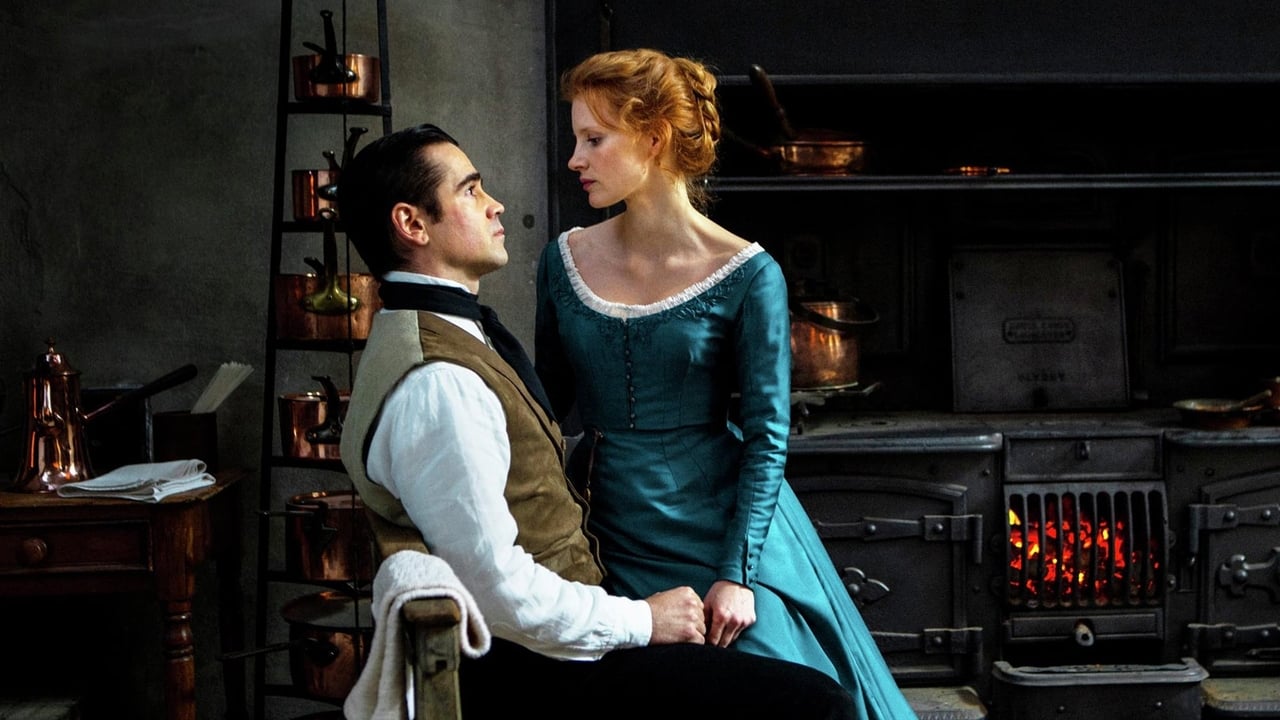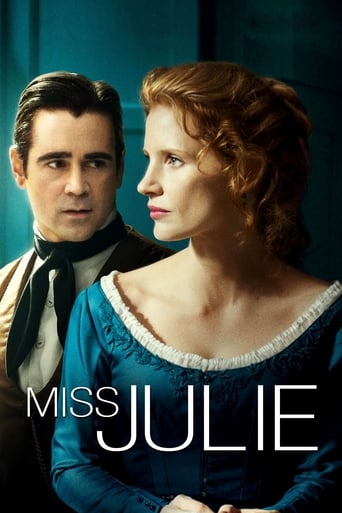

I'm not familiar with the source material, but the movie version of it, will not be everyones cup of tea. It feels like a drag and the pacing is slow to say the least. The characters seem to be stuck at a place where it'll be hard to feel something for them. Having said all that, the acting is superb and if you like your drama to be slow paced, but filled with dialog to make you think about, this could be exactly the one you were looking for.It never did have the punch or the feeling that it could be something great to me, but that's always in the eye of the beholder and might feel different for people who know more about it (more familiar with source material) than myself. It also feels like it is way too long for its own good. While good, there are things that make this tough to watch ...
... View MoreFrom the works of William Shakespeare to more modern works, stage plays have always provided a rich source of material for filmmakers. August Strindberg's 1888 play Miss Julie has apparently been a particularity rich source, having been adapted for the screen more than a dozen times in little more than a century. While not being overly familiar with the play, and perhaps drawn more by the actors than the source material, I recently sat down to take in the latest film version of the play and discovered an interesting, if often contradictory piece of work.On the surface, the film is well acted. There's only really three performers in the whole film: Jessica Chastain as the title character, Colin Farrell as the valet John and Samantha Morton as the maid Katherine who is also John's finance. Chastainis perfect casting as Miss Julie, the daughter of a wealthy baron sitting at home alone on a midsummer's night in 1890 who finds her fragile little world thrown into chaos. If there's any reason to watch the film it's Chastain who, with her red hair and green eyes standing out against her blue dress, goes on a remarkable emotional journey between extremes of happiness and sadness, authority and submissiveness, maturity and childishness, quiet contemplation and fits of anger before realizing that she is ultimately trapped by the world and situation she finds herself in. In a way, Chastain's performance sums up the entire film: beautiful, fragile and a mess of contradictions.Then there's Farrell and Morton. Of the trio, Farrell is the weakest in that his acting often seems forced rather than natural, making him at odds with his co-stars. Mot to mention an Irish brogue so thick you'll likely have to turn on subtitles to understand it which rather undermines the refined air that the character tries to put on and is meant to have (though that might be a deliberate move, it's hard to tell). That said, there's an undeniable chemistry between him and Chastain that makes their lengthy and at times unlikely encounters interesting to watch. Morton, the member of the trio with the least amount of screen time, comes across as an often silent and appalled witness to the events unfolding around her. It's her quiet, understated performance that makes for a wonderful contrast with the sometimes explosive performance Chastain gives. Together, they make for an interesting group of performers who bring the film to life.What makes their performances interesting is the script, adapted from the original play. Ultimately all three of these characters go on the same journey and discover the same thing: that despite whatever actions they may take they're ultimately trapped in the world and roles they find themselves in. What they do with that fact is what defines them. There's more to it than that of course as sparks fly in not only a battle of class but also of the sexes as each tries to gain the upper-hand over the other with consequences that ultimately prove both disastrous and that have an almost tragic inevitability to them. Even as character's bounce back and forth between emotional extremes, it somehow seems believable under the circumstances as roles are reversed and hearts both laid bare and broken in the space of a single night. The results are incredible to watch...at times.Which brings us to the production. The direction of Liv Ullmann, and the editing of Michal Leszczylowski, has the film unfold not with the white-hot intensity suggested by the dialogue or indeed the performances often suggest. Instead, the film unfolds slowly, never really building up momentum as it takes the viewer on its two hour journey. It's something that turns what could have been a fascinating, well paced drama into one that is as often infuriatingly static despite the emotions and tension building up between the characters. Making up for that is the film's visuals in the form of some beautiful cinematography from Mikhail Krichman as well as the sets and costumes of Mikhail Krichman and Consolata Boyle respectively. It's the combination of their work, and some gorgeous shots of the Irish countryside that makes the film visually interesting to watch when the direction and editing undermine performances. Yet they can't save the film from being at times the one thing it shouldn't be: dull.What are we to make of the film then? There's beautiful visuals and performances, including some of Chastain's best work to date in a career full of memorable performances. Yet the film is also treated with a fragility that at times undermines the drama unfolding within it as well as those aforementioned elements. It's an emotional drama that is played in a fashion that is contradictory to its nature and renders it at times utterly dull. In the end, the film is perhaps too much like its title character: beautiful, fragile and a mess of contradictions.
... View MoreJessica Chastain and Colin Farrell are superb. Although the critics seem to hate this movie, lauding it to be nothing like they imagined the play to be, nonetheless, having not ever seen the play or read it, I had nothing to base my preconceived ideas on. Therefore, this was something of a masterpiece. Incredible performances from the actors, painful, and actually a treatise to the hideous mores and codes of its times, despite being adapted by Liv Ullman, the over-riding theme is astonishing when you discover that the original play was written in 1888, and depicts the absurdities of human belief systems and caste systems. In this day and age, they would have had a rollick one night, said goodbye and avoided each other's eyes in the hallway whilst getting the heck on with their lives! A story of a very lonely, overly sensitive young woman who has no idea what life is about, and the sanctimonious serving maid who thinks that Jesus will save her, and how ultimately, a poor boy has a turmoil of stored hatred and vindictiveness toward the gentry, albeit rightly so, yet turns that into a crime that is inconceivable. An utterly brilliant work. Kudos to Liv Ullman. If you want action, no dialogue, and joy, this movie might not be for you. But if you want to take a good, long look at how evil the natural function of humanity is made by an unnatural society, this is a winner.
... View MoreAugust Strindberg wrote his play MISS JULIE in 1888 and while it is often performed today by classical repertory companies, the story is strong and deserves the very frank and stage-like production that brilliant actress Liv Ullmann brings to the screenplay adaptation and directs with a sure hand.The story is set on Midsummer's Eve on the estate of a Count in Fermanagh, Ireland. Miss Julie (Jessica Chastain in a brilliant performance), the young woman of the title, is drawn to a senior servant, a valet named Jean (Colin Farrell also quite brilliant), who is particularly well traveled, well mannered and well read. The action takes place in the kitchen of Miss Julie's father's manor, where Jean's fiancée, a servant named Kathleen (Samantha Morton), cooks and sometimes sleeps while Jean and Miss Julie talk. On this night the relationship between Miss Julie and Jean escalates rapidly to feelings of love and is subsequently consummated. Over the course of the story Miss Julie and Jean battle until Jean convinces her that the only way to escape her predicament is to commit suicide.While the acting and cinematography and production values are excellent, the aspect of Liv Ullmann's emphasis on Strindberg's reason for committing this work to the public – as one historian phrased it well, 'Miss Julie and Jean, as vying against each other in an evolutionary "life and death" battle for a survival of the fittest. The character, Miss Julie, represents the last of an old aristocratic breed about to die out. Whereas Jean represents one who is clambering upwards, and who is more fit to thrive because he is better able to adapt in terms of the "life roles" he can take on. The play contains a variety of themes, partly because Miss Julie's actions are motivated by a range of factors and influences: her class, her desires and impulsive nature, her father, and the dynamic traumas of her family histories.'The musical score is brilliant – various combinations of violin, cello and piano with works by Schubert and Bach performed by Håvard Gimse, piano, Truls Mørk, cello and Arve Tellefsen, violin. The music is an integral part of the atmosphere. Highly Recommended. Grady Harp, May 15
... View More